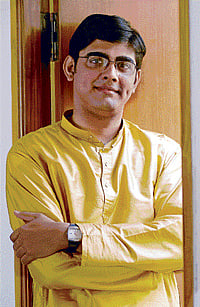

He graciously acknowledges those who wish him, thanks his accompanying artistes and unhurriedly makes his way off the stage, the poise he maintained in song continuing in his speech and gait. Meet Sikkil Gurucharan, thoroughbred Carnatic professional and youth icon.
Until Gurucharan’s arrival on the scene, the mention of Sikkil brought to mind the famed flautists, the Sikkil Sisters, Neela and Kunjumani, and Kunjumani’s daughter Mala Chandrasekhar.
But as a trendsetting vocalist, Gurucharan has not merely carried forward the family name; he has given it a new dimension. Asked if he is pressurised to live up to the Sikkil name, he replies, “Not at all. My grandparents never pressurised me to become a musician. They are just too happy that I took to music.”
Unlike his grandmothers, the Sikkil Sisters or aunt Mala, he did not take up the flute. He recalls, “One of my grandmothers spotted my vocal talent early on and decided that I should train formally in vocal music under a guru. So at the age of nine, I started lessons under Vaigal S. Gnanaskandan, a selfless teacher who continues to teach me. Of course I also learnt from my grandmothers and Mala (Chandrasekhar) Aunty. Mala Aunty’s mother-in-law Radha Vishwanathan (MS Subbalakshmi's daughter) also taught me some priceless compositions.”
Currently, he is getting special guidance from Maha Vidwan B Krishnamurthy, doyen of the Mudikondan school of music.
The stage became Gurucharan's second home at a young age. He debuted in Standard 8 at a place no less hallowed than the Madras Music Academy.
With a twinkle in his eye he says, “There were around 300-400 people. I wasn’t nervous then. Thinking about it gives me the jitters today.”
Given that he was a star student in school and a gold medallist in college, choosing music as a profession must have caused some dilemma?
Gurucharan clarifies, “By the time I was in my third year of college I was giving concerts regularly. Feedback from the audience, connoisseurs and organisers was encouraging. Once I completed my B.Com, my father approved my pursuit of music; that helped. I enrolled for M.Com by correspondence. I also worked as an RJ with the Carnatic music channel of World Space radio for a year. In 2005, when I started touring abroad, my decision to go professional was made.”
And he has never looked back since then, winning both fans and awards at a brisk pace. Besides having been feted by virtually all the reputed music sabhas in Chennai, Gurucharan is a recipient of the Russian Centre’s, ‘Tchaikovsky Award for the Best Young Musician,’ and the Sangeet Natak Akademi’s ‘Ustad Bismillah Khan Yuva Puraskar.’
Not one to be swept off his feet by such accolades, he says, “Some of the awards which I have received or some of the concerts I have performed may have been milestones; but they have not changed my career drastically.
The appreciation that I receive from the audience - maybe just for a single raaga or a single song, especially if it matches the thoughts and feelings I had as I sang that piece - that is indeed a milestone to me.”
A testimony to Gurucharan’s willingness to explore new paths is the success of his album Madirakshi, released a couple of years ago. The album is a collection of Carnatic music compositions sung in very slow tempo to the accompaniment of Anil Srinivasan on the piano.
Gurucharan explains that in this album, the Carnatic music kriti (composition) is not treated as such but as a poem. Asked if he also prefers to adopt this format in his concerts abroad, he responds, “When I go abroad to perform a Carnatic concert I stick to Carnatic; I don't change the format just because it is a Western audience. But when Anil and I perform together abroad, we do so to showcase contemporary Indian classical music. We don't bill that as a Carnatic music concert.”
Google ‘Sikkil’ and Sikkil Gurucharan's website is the first hit. Not surprising for a young man who understands the role today’s media plays in the life and success of a performer.
Considering himself lucky to have got good media exposure at the right time and the right place, this pragmatic artiste says, “In today's world, with so many options available to a rasika (a connoisseur of the arts), media exposure really helps. While practising music as a divine art and performing well is certainly important, you must also factor in the media, sponsors, and recording labels to be visible, successful and happy.”
The ever increasing number of concerts, the pressure to do well all the time, the travel - all this must be stressful? Gurucharan replies, “Stress is a part of any field. What matters in the performing arts is that you don't allow it to surface on stage and pass it on to others. When I have back-to- back concerts and travel schedules, I try my best to cope by watching movies, playing games online and sleeping. In fact, I am slowly beginning to enjoy this stress sometimes.”
Pressed to give a tip or two to youngsters, Gurucharan says, “I don't think I’ve reached a stage where I can give advice. All I can say is that it is a very good time to be a Carnatic performer right now. There are many people out there who are waiting to listen to good music. Take the right inputs, have patience to wait for the right opportunities and for luck to favour you.”
